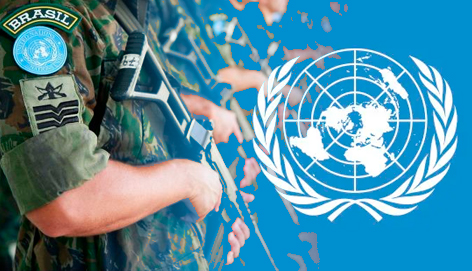Integrative review on motivation for peace missions
DOI:
https://doi.org/10.22480/rev.unifa.2024.37.658Keywords:
peace missions, motivation, peacekeeperAbstract
Understanding the elements that influence military volunteering for peacekeeping missions, an activity as relevant to the world as it is dangerous for those involved, can be essential to the success of these operations, as motivation plays a crucial role in determining the degree of commitment, performance, and resilience of those involved. To this end, an integrative review was carried out, aiming to explore and analyze articles related to the motivations of military personnel to participate in peacekeeping missions. The research consisted of a synthetic analysis of empirical studies, relevant theories, and practical approaches adopted by researchers on the subject, with five articles on the subject being analyzed. In summary, the findings of the studies presented suggest that selection and training processes for peacekeeping missions must be flexible, adaptable, and address the individual motivations, skills, and needs of soldiers. Additionally, providing support throughout the mission and opportunities to reflect on experiences after returning is crucial. This can help institutions develop policies, practices, strategies, and programs aimed at the psychological development of these individuals, reducing the rates of illness and psychological suffering among military personnel and promoting the success of operations.
References
Adler, A.B.; Litz, B.T.; & Bartone, P.T. (2003). The nature of peacekeeping stressors. In: Britt, T.W. & Adler, A.B. (org.). The psychology of the peacekeeper: lessons from the field. Connecticut: Praeger Publishers.
Comando da Aeronáutica. (2020). Estado-Maior da Aeronáutica. Manual para mapeamento de competências no Comando da Aeronáutica; ICA 35-14.
Cabral, A. & Nick, E. (2003). Dicionário técnico de psicologia. São Paulo: Cultrix.
Daróz, C.R.C. (2020). A pesquisa científica sobre missões de paz: panorama atual e possibilidades epistemológicas na história. In: Celestino, S. & Neves, A.N. (org). Missões de paz: teoria e dimensão humana. Curitiba: Appris.
Doron, R. & Parot, F. (2000). Dicionário de psicologia. São Paulo: Ática.
Freud. (1932). Por que a guerra? Indagações entre Einstein e Freud (cartas).
Governo do Brasil. (2021). Tropas de paz das Forças Armadas passam por inspeção da ONU.
Langholtz, H. J. (1998). The psychology of peacekeeping. Praeger Publishers/Greenwood Publishing Group.
Lannes, U.L.P. (1998). O Brasil e as Operações de Manutenção da Paz. Instituto de Estudos Avançados da Universidade de São Paulo.
Martinez, B.M.M. (2016). Motivação para ser militar: Ingresso na Academia da Força Aérea. Dissertação (Mestrado) – Academia da Força Aérea.
Ministério da Defesa (2013). Manual de Operações de Paz.
Ministério da Educação (2021). Caderno de teses da Coordenação de Aperfeiçoamento de Pessoal de Nível Superior. Catálogo de Teses e Dissertações.
Neves, A.N. (2022). Ser da paz não é fácil: análise das atitudes dos militares brasileiros em relação às missões de paz a partir de uma perspectiva microdinâmica. Dissertação (Mestrado) – Escola Superior de Guerra.
Organização das Nações Unidas (2021). What is peacekeeping.
Perry, J.; Hondeghem, A. & Wise, L. (2010). Revisiting the Motivational Bases of Public Service: Twenty Years of Research and an Agenda for the Future. Public Administration Review.
Ryan, R.M. & Deci, E.L. (2000a). Selfdetermination theory and the facilitation of intrinsic motivation, social development, and well-being. American Psychologist, 55(1).
Ryan, R.M. & Deci, E.L. (2000b). Intrinsic and extrinsic motivations: classic definitions and new directions. Contemporary Educational Psychology, 25(1).
Ryan, R. M., & Deci, E. L. (2017). Self-determination theory: Basic psychological needs in motivation, development, and wellness. Guilford Publications.
Schwartz, S. H. (1992). Universals in the content and structure of values: Theoretical advances and empirical tests in 20 countries. In M. Zanna (Ed.), Advances in experimental social psychology (Vol. 25, pp. 1-65). Academic Press.
Silva, N. (2015). Motivação e satisfação no trabalho. In: Bendassolli, P., & Borges-Andrade, J. (org). Dicionário de psicologia do trabalho e das organizações. São Paulo: Casapsi Livraria e Editora Ltda.
Soares, D.H.P. (2002). A escolha profissional: do jovem ao adulto. Porto Alegre: Summus Editorial.
Souza, W.F. (2007). Sintomas de estresse pós-traumático em militares brasileiros em Missão de Paz no Haiti. Dissertação (Mestrado) - Escola Nacional de Saúde Pública.

Downloads
Published
Issue
Section
License
Copyright (c) 2024 Bianca Silveira Rovella, Narbal Silva

This work is licensed under a Creative Commons Attribution-NonCommercial 4.0 International License.
Revista da UNIFA permite que o (s) autor (es) mantenha(m) seus direitos autorais sem restrições. Atribuição-NãoComercial 4.0 Internacional (CC BY-NC 4.0) - Revista da UNIFA é regida pela licença CC-BY-NC








